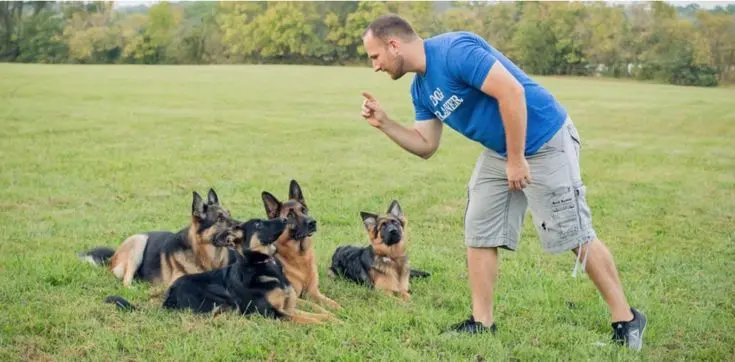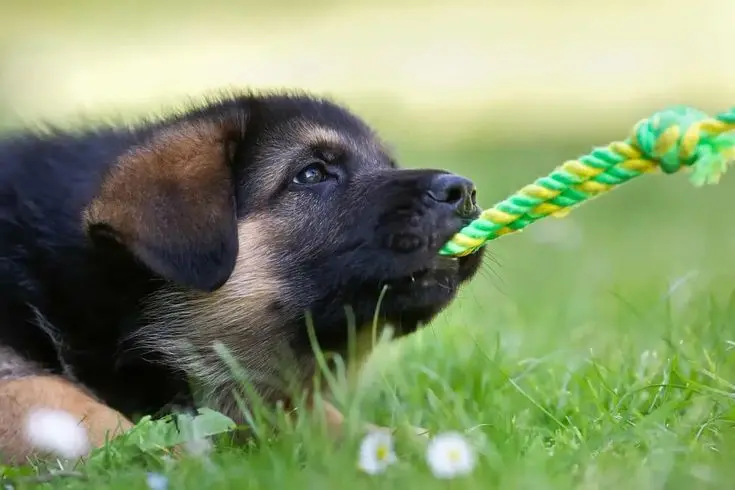Socializing a German Shepherd puppy helps them become a confident and well-adjusted adult. Start by exposing your puppy to different environments, people, and animals. German Shepherds are intelligent, loyal, and versatile breeds. They grow up to be wonderful family pets, service dogs, or police dogs. Early socialization makes them less wary of strangers and enhances their naturally protective nature.
Why socialization is important for German Shepherds?
Socialization is very important for your German Shepherd. It helps them interact with other animals and people in a positive way. This development makes them feel healthy and safe. It also builds trust, reduces fear, anxiety, aggression, and stops bad behaviors.
When to socialize a German Shepherd?
Socializing your German Shepherd should start as early as possible. The best time to begin is when they are 8-12 weeks old. This critical period is crucial for learning how to interact with other animals and people. If you socialize your pup now, they will more easily accept new experiences. If you wait until your German Shepherd is 4 years old, it might be too late. They could become hesitant and wary of new stimuli. But don’t worry, stay focused, and stay with us to learn how to socialize an adult German Shepherd.
How To Socialize A Puppy The Correct Way

To ensure your German Shepherd puppy grows up to be a well-established adult who handles stresses of every day, modern life without feeling alien or disconcerting, start socialization early. Socializing your puppy the right way includes more than just leash walks; it involves meeting and greeting new people, dogs, and exploring new places filled with various sights and smells. This helps your dog feel perfectly comfortable in any environment, capturing the positive benefits of socialization while helping you avoid mistakes that could set back their development. Let’s discuss the 10 best ways to socialize your Puppy German Shepherd
1. Meet your German Shepherd with your friends
When you help your German Shepherd meet your friends, you are fostering social connections. It’s important for them to get accustomed to a variety of different people and animals in a safe, controlled environment. This part of the socialization process helps them learn to interact with others with trust and mutual respect, making them feel at home in any environment.
2. Take your German Shepherd to the park
Taking your German Shepherd to the park is a fun part of socialization training. This helps them learn to interact with different people, dogs, and other animals in a safe and controlled way. It makes them comfortable in new environments and teaches them to behave correctly. This also reduces bad behavior like barking and aggression, and helps them build relationships.
3. Walk your German Shepherd near the school
Walking your German Shepherd near the school playground is a great part of socialization training. When your puppy sees kids playing, it learns how to behave around children and builds good relationships. This helps prevent aggressive behaviors and fear, making sure your dog can have positive relationships with dogs, people, and other animals. Always watch how they interact during these visits.
4. Take your German Shepherd to work
Taking your German Shepherd to work can be a great opportunity for socialization training. It’s a great way to help your dog get used to different people, animals, and new sounds. Your boss might find it a suitable idea to have a pet present at the workplace. It’s a lucky chance for your puppy to interact and learn!
5. Introduce new walking spots to your German Shepherd
Introducing new walking spots can help your German Shepherd learn to socialize better. Taking your puppy to different locations lets them explore various sights, sounds, and smells. This is good for their well-being. Dogs of this breed are curious and enjoy new stimuli. Walking in different environments where they are exposed to a variety of experiences is key to effective socialization training.
6. Take your German Shepherd to the community events
Taking your German Shepherd to community events is a fun way to give them social exposure. They can meet different people and animals, and explore new environments. These activities help them get used to various communities and dog-friendly events. It’s good for their pet ownership and socialization training. They’ll learn about new sights, sounds, and smells, and enjoy meeting new people.
7. Vet office and groomer’s
Taking your German Shepherd puppy to vet offices and the groomer’s is an important part of socialization training. These places offer a controlled environment where your puppy can interact with other dogs, animals, and people. With the grooming tools around, they learn to reduce stress during vet visits and get comfortable in a non-threatening setting.
8. Take your German Shepherd on the road trip
Taking your German Shepherd on road trips is a great way to help them socialize. Start with short trips to get them used to car rides. This exposure to new places, people, and environments makes them more comfortable. Always have water, food, and medications for any emergency.
9. Meet your German Shepherd with other dogs
Introduce your German Shepherd to other dogs in a safe, controlled environment like a park or a friend’s house. Keep your puppy on a leash, approach slowly and calmly, and use treats as rewards. For extra safety, consider using a dog muzzle and other safety equipment. This helps them feel more comfortable and grow confident in social situations, reducing aggressive behaviors.
10. Hit the pet shop with your German Shepherd
Visit a pet shop with your German Shepherd to help them get socialized. This gives your pup lots of exposure to new sights, sounds, and smells. Make sure the store is clean, well-maintained, and has friendly staff. Keep them on a leash but let them roam a bit. Give treats as rewards for good behavior. This helps them feel comfortable and safe as they interact with other pets and people.
The Wrong Ways to Socialize a German Shepherd Puppy
It’s important to avoid mistakes when teaching your German Shepherds to be friendly. Some pitfalls in socialization can cause behavioral issues like aggression or anxiety. Do not use steps that make them scared or very protective. This helps keep their intelligence and loyalty strong.
1. Delaying the Process
If you wait longer than 3-14 weeks to start socializing your German Shepherd puppy, it can be more challenging. The best time to begin the socialization process is when they are still months old. This makes training more effective.
2. Overwhelming the German Shepherd Puppy
When helping your German Shepherd puppy adjust, don’t rush them into too many new experiences at once. This can be stressful for them. It’s essential to give them time to get comfortable with each moving step before moving to the next one in the process.
3. Forcing Interaction
When teaching your German Shepherd puppy to meet new friends, never push them into a situation where they might feel trapped or overwhelmed. Pushing a puppy to face their fears can backfire and make their anxieties worse.
4. Neglecting Diversity of Experiences
Neglecting diversity of experiences for your German Shepherd puppy can lead to problems. If they are only exposed to one type of environment or group of people, they might develop fears or aggression towards others. Narrow exposure means they get scared when going outside their usual spaces.
5. Ignoring Negative Reactions
When your German Shepherd puppy shows signs of fear or aggression, it is essential to address these reactions immediately. Ignoring them and hoping they will grow out of it can lead to long-term behavioral issues. Always respond gently to help them feel secure.
6. Skipping on Puppy Classes
Skipping on puppy classes can deprive your German Shepherd of important interactions. These classes offer a controlled and positive setting where dogs meet people and other puppies. Structured environments with professional trainers help address any issues that are budding.
7. Avoiding Strangers
When teaching your German Shepherd puppy to protect itself, it’s important to manage how they avoid strangers. This helps prevent aggression and fear of unfamiliar people in the future. Let them meet new friends slowly and safely.
8. Using Negative Reinforcement
Using negative reinforcement, like punishing a German Shepherd puppy for showing fear or aggression, can make socialization harder. This approach might exacerbate the issue. Instead, use positive reinforcement techniques to encourage the desired behaviors. This method helps reduce fear and aggression during socialization.
9. Not Socializing with Other Animals
If your German Shepherd puppy doesn’t get exposure to other animals like dogs, cats, and household animals, it’s a missed opportunity. Being introduced to many humans and animals helps ensure a well-rounded socialization. Meeting other pets makes them friendlier and calmer.
14. Skipping Vet Visits
Skipping vet check-ups can affect the health of your German Shepherd puppy. These visits are also an opportunity to socialize them. By avoiding these, your puppy misses becoming accustomed to being handled by strangers in a clinical setting.
Conclusion
Socializing your German Shepherd puppy is a crucial step towards ensuring they grow into a well-rounded, confident adult dog. By introducing them to a variety of environments, people, and other animals from a young age, you help them develop a sense of security and adaptability. Whether it’s through meeting new friends at the park, exploring new walking paths, or attending community events, each experience enriches their understanding and comfort with the world around them. Remember, the goal of socialization is to foster a positive disposition and minimize fears and aggressive tendencies. By consistently practicing these socialization techniques, you ensure your German Shepherd will thrive in any situation, making them a beloved and trusted member of your family and community.
FAQs
How to socialize a reactive German Shepherd?
When your German Shepherd puppy feels upset or scared around other dogs or people, it’s important to help them relax and feel safe. During walks or outings, keep things calm and quiet. Avoid places that are too noisy as it can make your puppy nervous. If they do good around new friends, give them lots of praise. This helps your dog learn that meeting new people is a fun thing!
Is it OK to leave a German Shepherd alone?
Leaving a German Shepherd alone for more than 8 hours a day isn’t a good idea. They get easily bored and might start showing problematic behavior like digging, chewing, and barking. This can be very destructive.
Are German Shepherds good with new people?
German Shepherds are very alert and protective, making them excellent family dogs. When strangers come to the house, these dogs might react strongly because they detect potential threats to keep their families safe. It can take some time for them to relax and warm up to new people, but once they do, they are very loyal and welcome everyone as friends.
What are the signs of an unsocialized German Shepherd?
When a German Shepherd puppy hasn’t learned how to socialize, it might act timid or skittish. In new situations or around unfamiliar people and animals, they might show aggressive behaviors like barking, growling, snapping, or lunging. This puppy could also be seen cowering, hiding, or shaking because it feels scared. It’s important to help them feel safe and positive so they can grow up happy and well-adjusted.


